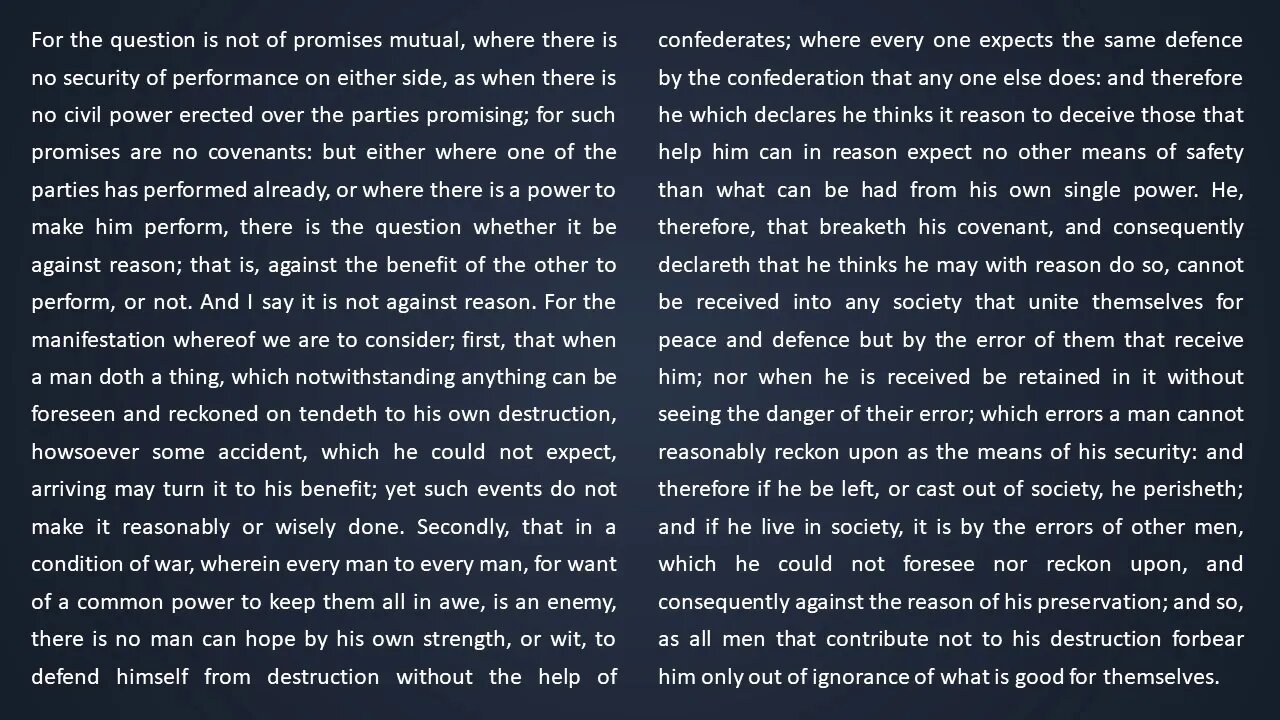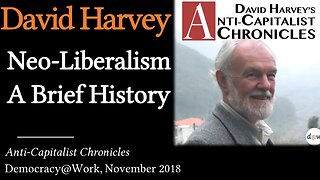Premium Only Content

Hobbes on the Fool's problem (quote)
Hobbes discussing the Fool's problem from Chapter 15 of the Leviathan.
"The fool hath said in his heart, there is no such thing as justice, and sometimes also with his tongue, seriously alleging that every man's conservation and contentment being committed to his own care, there could be no reason why every man might not do what he thought conduced thereunto: and therefore also to make, or not make; keep, or not keep, covenants was not against reason when it conduced to one's benefit. He does not therein deny that there be covenants; and that they are sometimes broken, sometimes kept; and that such breach of them may be called injustice, and the observance of them justice: but he questioneth whether injustice, taking away the fear of God (for the same fool hath said in his heart there is no God), may not sometimes stand with that reason which dictateth to every man his own good; and particularly then, when it conduceth to such a benefit as shall put a man in a condition to neglect not only the dispraise and revilings, but also the power of other men. The kingdom of God is gotten by violence: but what if it could be gotten by unjust violence? Were it against reason so to get it, when it is impossible to receive hurt by it? And if it be not against reason, it is not against justice: or else justice is not to be approved for good. From such reasoning as this, successful wickedness hath obtained the name of virtue: and some that in all other things have disallowed the violation of faith, yet have allowed it when it is for the getting of a kingdom. And the heathen that believed that Saturn was deposed by his son Jupiter believed nevertheless the same Jupiter to be the avenger of injustice, somewhat like to a piece of law in Coke's Commentaries on Littleton; where he says if the right heir of the crown be attainted of treason, yet the crown shall descend to him, and eo instante the attainder be void: from which instances a man will be very prone to infer that when the heir apparent of a kingdom shall kill him that is in possession, though his father, you may call it injustice, or by what other name you will; yet it can never be against reason, seeing all the voluntary actions of men tend to the benefit of themselves; and those actions are most reasonable that conduce most to their ends. This specious reasoning is nevertheless false."
-
 57:58
57:58
Philosophy with Alexander Koryagin
1 year agoDavid Harvey: A Brief History of Neo-Liberalism & The Financialization of Power | ACC 01-03
4221 -
 0:03
0:03
4Everly
3 years ago3 on 1 NO Problem!!!
8 -
 0:40
0:40
THEANIMATED UNIVERSE
3 years agoapril fool's
8 -
 LIVE
LIVE
Barry Cunningham
15 hours agoBREAKING NEWS: PRESIDENT TRUMP MAKES AN ANNOUNCEMENT!
1,999 watching -
 LIVE
LIVE
Side Scrollers Podcast
2 hours agoSide Scrollers VTuber TAKE OVER with Kirsche, Rev Says Desu & DarlingStrawb | Side Scrollers
723 watching -
 53:52
53:52
The White House
3 hours agoPresident Trump Makes an Announcement, Nov. 6, 2025
10K16 -
 1:02:55
1:02:55
VINCE
4 hours agoThey're Coming For You Next | Episode 163 - VINCE 11/06/25
197K263 -
 1:42:05
1:42:05
Graham Allen
4 hours agoTrump And Vance Show The Path For Winning!!! WE MUST FIGHT! + Erika Kirk Reveals All!
138K40 -
 LIVE
LIVE
LadyDesireeMusic
3 hours ago $0.04 earnedLive Piano & Convo - Rumble Rants and Sub Request
160 watching -
 1:10:27
1:10:27
Chad Prather
19 hours agoThe Secret To Pleasing The Lord Over Man!
97.8K54